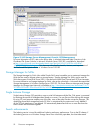
When enabling disk quotas for a volume, volume usage is automatically tracked from that point forward,
but existing volume users have no disk quotas applied to them. Apply disk quotas to existing volume
users by adding new quota entries on the Quota Entries page.
NOTE:
When enabling disk quotas on a volume, any users with write access to the volume who have not
exceeded their quota limit can store data on the volume. The first time a user writes data to a
quota-enabled volume, default values for disk space limit and warning level are automatically assigned
by the quota system.
For more information about d is k quotas, read the online help.
Adding storage
Expansion is the process of adding physical disks to a n array that has already been con figured.
Extension is the process of adding new storage space to an existing logical drive on the same array,
usually after the array has been expanded.
Storage growth may occur in three forms:
• Extend unallocated space from the original logical disks or LUNs.
• Alter LUNs to contain additional storage.
• Add new LUNs to the system.
The additional space is then extended through a variety of means, depending on which type of disk
structure is in use.
NOTE:
This section addresses only single storage server node configurations. If your server has Windows
Storage Server 2003 R2 Enterprise Edition, see the Cluster Administration chapter for expanding and
extending storage in a cluster environment.
Expanding storage
Expansion is the process of adding physical disks to an array that has already been configured. The
logical drives (or volumes) that exist in the array before the expansion takes place are unchanged,
because only the amount of free space in the array changes. The expansion process is entirely
independent of the operating system.
NOTE:
See your
storage array hardware user documentation for further details about expanding storage on
the array.
Expanding storage for EV A arrays using Command View EV A
Presenting a virtual disk offers its storage to a host. To make a virtual disk available to a host, you must
present it. You can present a virtual disk to a host during or after virtual disk creation. The virtual disk
must be completely created before the host presentation can occur. If you choose host presentation
during virtual disk creation, the management agent cannot complete any other task until that virtual
disk is created and presented. Therefore, HP recommends that you wait until a virtual disk is created
before presenting it to a host.
To extend a virtual disk in a single-node environment:
1. Using the HP StorageWorks Storage Management Appliance (SMA) or Command View EVA hosted
on a server, create or extend the virtual disk presented to the storage server.
HPProLiantDL380G5StorageServer 59


















